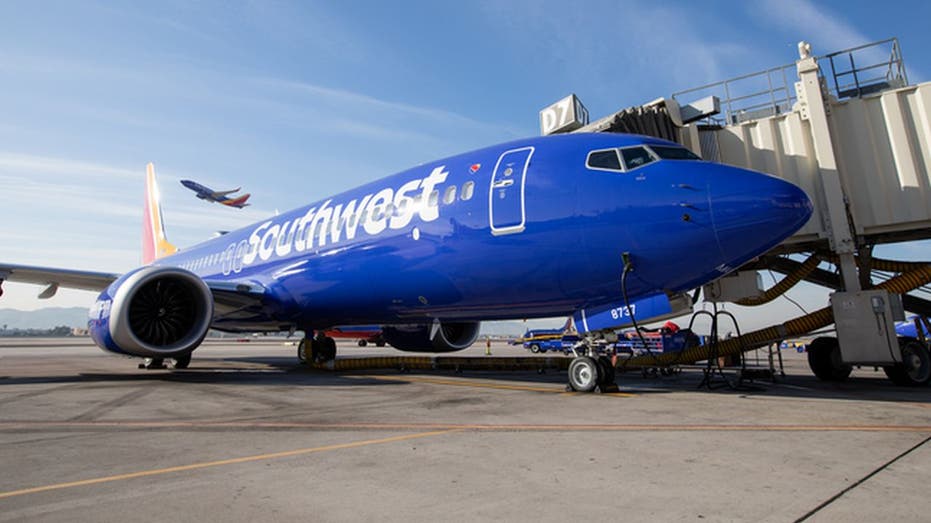Southwest flight attendant blames airline for husband's COVID-19 death: Lawsuit
Southwest filed a motion to dismiss the case, calling the allegations 'misplaced.'
A Southwest Airlines flight attendant filed a lawsuit against the carrier, claiming it failed to properly protect staff from being exposed to the coronavirus during mandatory training last summer, which led to her husband's death.
According to court documents filed in March, Baltimore-based flight attendant Carol Madden's husband, Bill, died on Aug. 12 at 73 years old from "COVID-19 and the complications thereof, having contracted that illness from Ms. Madden," who had to undergo required training sessions.
The airline, although "incredibly sympathetic" to those who have lost loved ones due to COVID-19, is seeking to dismiss the case saying that the blame laid on the company is "misplaced."
| Ticker | Security | Last | Change | Change % |
|---|---|---|---|---|
| LUV | SOUTHWEST AIRLINES CO. | 54.25 | +1.75 | +3.32% |
CLICK HERE TO READ MORE ON FOX BUSINESS
Last July, Carol Madden had been required to attend "Recurrent Training that would lead to renewal or reauthorization of her ‘Certificate of Demonstrated Proficiency,'" according to the suit.
Southwest had conducted the daily mandatory sessions for flight attendants at its BWI Airport base for a week starting July 13.

A Southwest Airlines aircraft sitting idle (Southwest Airlines/Stephen M. Keller)
From the start of the training, however, the suit claims "Southwest utterly failed to implement the most basic precautions to safeguard the health and wellbeing of the Flight Attendant Trainees" including not properly conducting contact tracing.
GET FOX BUSINESS ON THE GO BY CLICKING HERE
The suit further claims that the airline didn't screen any flight attendant in Carol Madden's training sessions for COVID-19 including taking their temperature or asking "any of the basic health screening questions commonly asked."
After one of the sessions, Carol Madden's husband picked her up from the airport. However, a few days later Carol Madden "began to experience some of the initial symptoms" of the virus, promoting both her and her husband to get tested.
"Ms. Madden’s exposure to SARS-CoV-2 was primarily caused by the failure of Southwest to exercise a basic standard of care that would have prevented the transmission of the virus," the suit read.
Carol Madden later learned through a "disturbing" Facebook post that a fellow attendee, which she shared a table with during training, had tested positive for the virus and advised the airline shortly after.
WHY SO MANY COVID-19 WORKERS’ COMP CLAIMS ARE BEING REJECTED
However, the suit alleged that "Southwest failed to publicize it, to perform contact tracing, to alert potentially affected employees" including Madden.
On Aug. 1, Bill Madden's "condition had declined dramatically."
Health care officials at WellSpan Hospital in York, Pennsylvania, determined he had "contracted COVID pneumonia with ‘ground glass’ in his lungs as a complication of COVID-19."
In a statement to FOX Business, Southwest said the well being of its employees and customers "has been our uncompromising priority" and that the airline has "taken enhanced measures to clean and maintain our aircraft, airports, and work centers and follows all notification guidelines in accordance with the CDC."
The "Southwest Team works each day to ensure that our multi-layered approach to supporting our Employee and Customer safety stays current with research findings and public health recommendations," the airline said.
Southwest filed its motion to dismiss on Friday. In the filing, the airline said that the "blame laid on Ms. Madden’s employer for the death of her husband in the Complaint is misplaced" and that the company "strongly denies the allegations that it failed to meet the requisite standard of care when implementing COVID-19 health and safety procedures to protect its employees at the training."
The airline acknowledged that it's part of the employer's "duty of care to provide a reasonably safe work environment" but "that duty does not extend to members of the employee’s household."





















